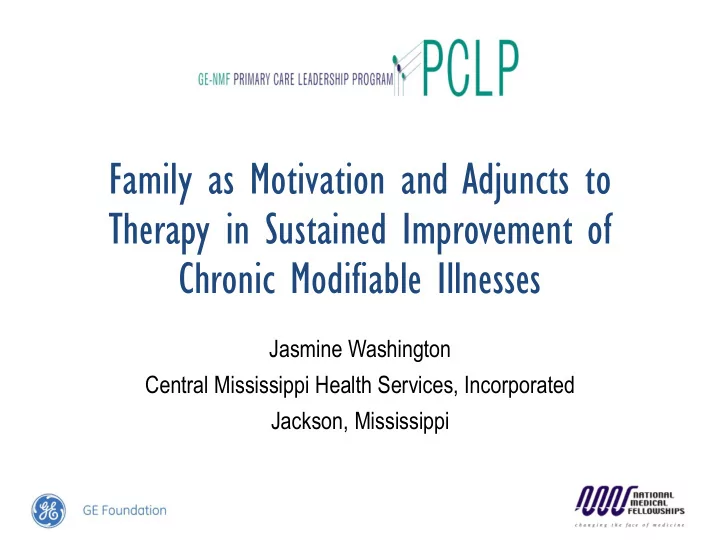

Family as Motivation and Adjuncts to Therapy in Sustained Improvement of Chronic Modifiable Illnesses Jasmine Washington Central Mississippi Health Services, Incorporated Jackson, Mississippi
Introduction • Chronic Illnesses are present in about 50% of Americans • Conditions include: Hypertension, Diabetes, Hyperlipidemia, Obesity, Heart Disease, Respiratory Illnesses • 1/3 of patients with chronic illnesses are living with 2 or more chronic conditions • The most common of these conditions are both modifiable AND potentially preventable with lifestyle alterations • Many conditions “run” within immediate family members • Some patients feel powerless to prevent these conditions
Background • Treatment of Chronic Illnesses mainly includes medications and lifestyle changes • Lifestyle modifications are sometimes proposed without adequate resources or consideration of patient circumstances • Many patients must be placed on polypharmacy to control their conditions • Up to 60% patients on medications for chronic illness are not compliant ; 30-60% of these patients fail to take medications as prescribed • Family members may prove to be a promising supplement to the care of patients with chronic illnesses • Hypothesis 1: Family involvement in the care of patients with chronic modifiable illnesses is related to an increase in compliance to prescribed treatment regimens to improve patient outcomes. • Hypothesis 2: Family involvement in therapy of patients with chronic modifiable illnesses is related to a decrease in the prevalence of chronic modifiable illnesses in immediate family members.
Methodology • 4 Page Questionnaire distributed at all 3 CMHS sites (Winter Street, Robinson Road Extension, and Tougaloo College) over a 3 week period • Distributed in the waiting room, post-triage, and while waiting in the exam room • For patients with difficulty reading the survey, assistance was given • Upon completion, surveys were collected either by me or placed in a designated box at the front desk
Results • Common chronic illnesses do tend to “run” in families 120 98 100 81 80 67 60 45 40 34 31 30 40 16 16 15 11 20 8 6 3 0 0 Family History Personal History • Many of those with chronic conditions (51%) have 2 or more conditions for which a significant portion (41%) take 4 or more medications daily
Results • 70% of patients state they do engage in some form of exercise • Only 17% of those who do exercise admit to doing so with family members • 47% of patients state their family members encourage healthy eating habits • 76% of patients feel their lifestyle changes also improve their family’s health • 77% of patients feel their family is important to the treatment of their chronic condition (s) • Only 33% of patients have family members consistently involved in some form with their clinic visits
Discussion • It is likely due to similar lifestyle choices or stressors that many common chronic illnesses “run” within families • Of those patients that stated they did exercise, a significant portion only did so occasionally, which may have contributed to the low percentage of patients exercising with family members • Family members of patients with chronic illnesses may fail to advocate for healthier eating habits because they do not live with the patient or are unable to judge their regular eating habits • It could also be due to the lack of understanding that eating habits can significantly impact their health • Patients feel their family is important to their treatment and affects treatment compliance but also feel their family members do not necessarily encourage specific forms of positive lifestyle changes like healthier eating or accompanying patients to clinic visits • This may also be due to inability of family members to take leave from work in order to accompany a family member to the clinic • Patients feel their lifestyle changes have positively impacted the health of their families • It is unclear if this has or will lead to downward trends in incidence or prevalence of chronic illness within immediate family members
Recommendations • Encourage patients to bring family members to clinic visits with them • Helps to improve compliance, holds patient accountable, and provides an in-home support system not to mention a potential source of new patients and additional revenue • Motivational interviewing, focused on potential socioeconomic and environmental barriers to positive lifestyle changes • Family-centered educational programs to educate high risk or non-compliant patients and their family members or caretakers about chronic illness and realistic methods to increase patient management of illness
Conclusion • Chronic illness in America is widely prevalent but reasonably preventable • Hypertension, Diabetes, Hyperlipidemia are the most common chronic illnesses that “run” in families • Family centered education can enhance patient and family understanding of these conditions and ensure treatment is effective • Many with chronic illness (especially those with 2 or more) are prescribed polypharmacy and lifestyle modifications to treat conditions • Motivational interviewing and active encouragement of family involvement can increase the likelihood of compliance and positive outcomes
Acknowledgements In addition to giving thanks to the entire CMHS staff, I would like to give special thanks to: • GE PCLP Program • The Warren Alpert Medical School of Brown University • Mrs. Eurekia Samuel • Mr. Peter Gregory • Ms. Mary Douthit • Ms. Moses • Ms. Vanessa Bradfield • Dr. Tamara Winfield • Dr. Janice Bacon • Dr. Thais Tonore • Dr. Robert Smith
Recommend
More recommend